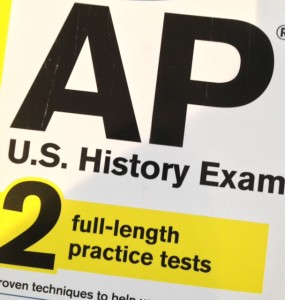New Changes to the AP Program

October 22, 2014
Each year about two million students take Advanced Placement (AP) exams, tests designed by the College Board to assess students’ understanding of introductory college course subject matter. This year, two significant changes have taken place in the AP Program, affecting a large number of Ward Melville students in AP Physics B and AP U.S. History.
The AP Physics B course, an algebra-based course, covers topics in mechanics, electricity and magnetism, fluid mechanics and thermal physics, waves and optics, and atomic and nuclear physics. The one-year course will essentially be divided into two separate yearlong AP courses: AP Physics 1 and AP Physics 2, both of which are also algebra based, and have their own AP exams. The hope is that students will have more time to garner a better understanding of key principles and concepts.
AP Physics 1 course is equivalent to a first-semester college course in algebra-based physics, covering Newtonian mechanics, work, energy, power, and mechanical waves and sounds. The course will also introduce electric circuits. In contrast, AP Physics 2 is equivalent to a second-semester college course in algebra-based physics, covering fluid mechanics, thermodynamics, electricity and magnetism, optics, and atomic and nuclear physics.
While the hope is that students will have more exploration of physical content, there has been criticism of the new changes as well. In response to the changes, senior Swati Gupta says, “Splitting the one year AP Physics B course into two years allows students to develop a better understanding of the subject… however many students in other parts of the country may not take both years of physics then.” Ward Melville High School continues to offer both courses in a single year, with the students taking two different AP exams at the close of the year.
Another AP exam that is changing is the AP U.S. History exam. One of the most popular AP courses offered at Ward Melville, the new exam features fifty-five multiple choice questions, four short-answer questions, one document-based questions, and one long essay question. In contrast, the exam previously consisted of eighty multiple choice, one document-based question, and two long essay questions. Regarding the changes, junior Ariel Leong says, “Despite the new exam the class hasn’t changed much, besides a new textbook that is more suited to the new course and a few newly styled multiple choice questions.”
Additionally, the 2015-2016 school year will also see changes in the Advanced Placement curriculum, with revision to AP Art History and AP European History. The College Board hopes that the redesigned courses will underscore the key concepts and critical thinking that are highly valued by colleges and universities.


